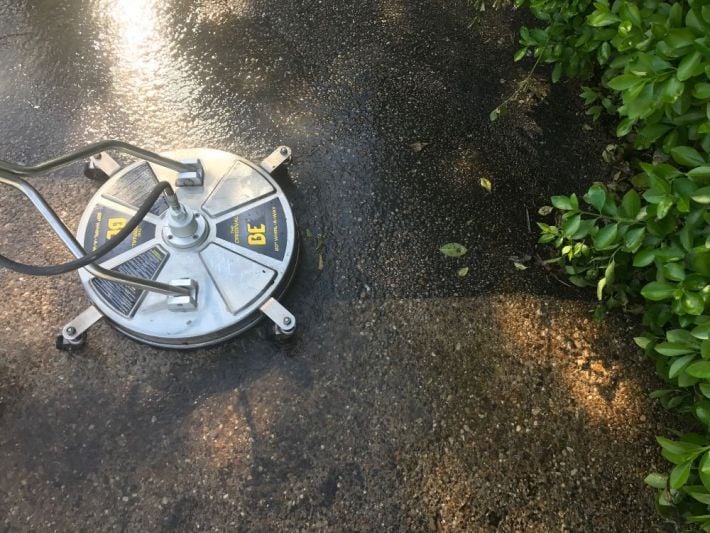Topics:
Search for topics or resources
Enter your search below and hit enter or click the search icon.
Providing your email address will keep you updated should we need to provide updates specific to your location.
September 4th, 2024 | 3 min. read
By Sarah Etler

When it comes to cleaning concrete, you might have heard the terms "pressure washing" and "power washing" used interchangeably. Many professionals even do this!
While both methods are effective at removing dirt and grime, there are key differences between the two.
This article will compare pressure washing and power washing to help you determine which method is right for your concrete cleaning needs.
Pressure washing involves using a high-pressure water spray to remove dirt, mold, grime, and other contaminants from surfaces. Pressure washers are available in various sizes and power ratings, typically measured in PSI (pounds per square inch).
Pressure washers are typically the go-to, at-home tool used to clean concrete, but they lack certain features that make them ideal for heavy-duty cleaning.
Pressure washing is suitable for a wide range of surfaces, including concrete, wood, and siding.
Affordable pressure washers are readily available for rent or purchase at hardware
stores.
A pressure washer can remove most dirt and grime with the right PSI setting, nozzle,
and patience.
Pressure washing is done with cold water, which may be less effective at removing oil stains and grease.
Lower PSI models might not be powerful enough for really dirty concrete.
Power washing is similar to pressure washing but adds the benefit of heated water.
The combination of high-pressure and hot water makes power washing particularly effective at removing stubborn stains and contaminants.
Hot water helps break down tough stains, such as oil, grease, and salt deposits.
Power washers are more effective at cleaning heavily soiled surfaces, reducing cleaning time.
Read More: How Much Does Concrete Cleaning Cost? Concrete Cleaning Cost Guide
Power washers are typically more expensive to rent or buy than pressure washers. They are often the tool of choice for professionals who do industrial cleaning on a large scale.
The high pressure and heat from power washers can damage delicate surfaces if not used correctly.
May not be as readily available for rent as pressure washers.
Pressure washing is ideal for routine maintenance and cleaning mildly dirty concrete surfaces. It’s also better suited for cleaning surfaces that could be damaged by high heat.
Power washers are best for tackling oil, grease, and other tough stains that pressure washing can't remove. Power washers are also effective at eliminating and preventing mold and mildew growth.
Read More: How To Clean Concrete [Step-by-Step DIY Guide]
Choose a nozzle that provides a wide spray pattern or a surface cleaning attachment to avoid concentrating too much pressure on one spot, which can cause damage.
Turbo nozzles are another good option – they rotate and create a broader overall spray when further away and a finer point when brought closer to a surface, allowing for more flexibility in navigating changing conditions on a project.
Hold the wand at least 12 inches from the surface when starting to prevent etching or damaging the concrete. Always try to be consistent with the height of the wand to maintain a consistent cleaning.
Pro Tip: Moving consistently is also important. Moving too fast will not clean enough, and moving too slowly can etch the surface.
When there is a chance of direct spray, cover nearby plants, windows, and doors with plastic sheeting or tarps to protect them from high-pressure water and cleaning chemicals.
Always test the pressure, heat, and any cleaning solution on a small, hidden area to make sure it doesn’t cause damage.
Spray at a 45-degree angle to the surface to help lift dirt and debris without driving it deeper into the concrete pores. This can also help ensure that any loose debris kicked up by the force of the water moves away from you.
Be extra careful around siding, windows, and other delicate areas that could be damaged by high pressure or hot water.
Remember that professionals use these tools daily and have the experience to handle tough cleaning jobs efficiently and safely. If in doubt, consider hiring a professional service to avoid potential damage and achieve the best results.
Both pressure washing and power washing are effective methods for cleaning concrete, but the choice depends on your specific needs.
For routine maintenance and cleaning moderately dirty concrete, a pressure washer is usually more than enough to get the job done right. However, if you're dealing with stubborn grease or oil stains, or need a deep clean on extremely dirty concrete, investing in a power washer or hiring professional industrial cleaners can be worth the extra cost.
Also, it’s important to remember that while pressure washing and power washing are different, many people use the words interchangeably.
Many A-1 Concrete Leveling locations nationwide offer concrete cleaning services – request a free onsite cost estimate or check out this DIY concrete cleaning guide to get one step closer to cleaner concrete!
Sarah Etler joined A-1 Concrete Leveling after receiving her Bachelor of Arts degree in English from Northern Kentucky University. As A-1's Content Marketing Manager, she works closely with industry experts to produce content that will best answer questions related to concrete repair and maintenance practices. Sarah loves living a life full of discovery and is excited every day to see what new things she can learn and share with those around her.
Topics: